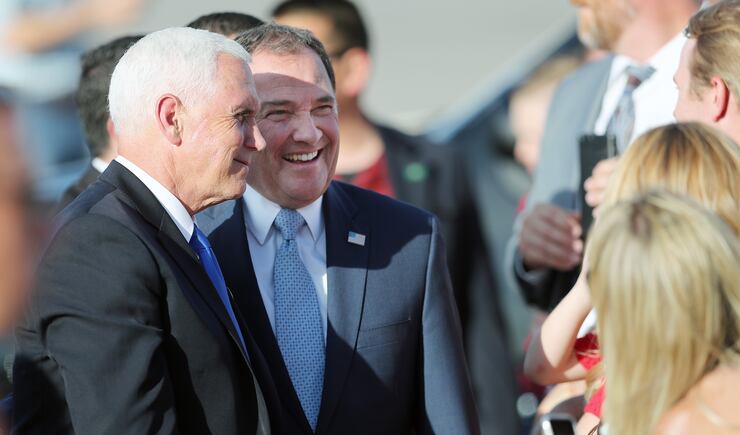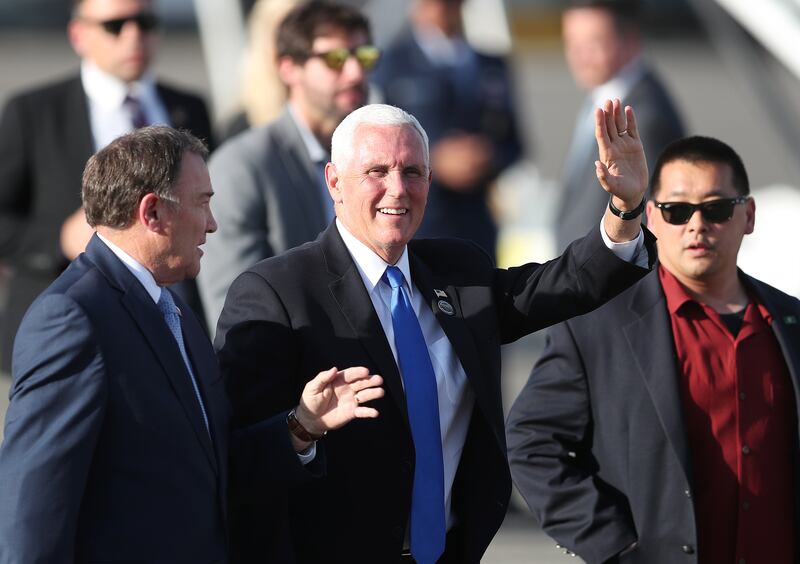SALT LAKE CITY — As one of few states in the country with a trade surplus, Utah makes an attractive backdrop for Vice President Mike Pence to promote the languishing new U.S. trade agreement with Canada and Mexico.
More than 3,500 companies — 85% of which are small businesses — in the Beehive State export about $16 billion in goods and services worldwide each year, about $4 billion more than Utah imports annually.
“That of course is President Trump’s main complaint as it relates to trade is that we’re not selling as much to other countries as we’re buying. His interpretation of that is that we aren’t getting a fair shake in some of those countries, China would be a top example of that,” said Derek Miller, Salt Lake Chamber president.
“But for Utah, we actually do have a trade surplus to the tune of about $4 billion a year.”
Not only are Utah businesses engaged in the global marketplace, they’re competing and winning, Miller said.
“It’s no surprise that the vice president would want to come to Utah as a place to highlight how it should work,” he said.
Pence landed in Salt Lake City on Air Force Two on Wednesday evening after pitching the United States-Mexico-Canada Agreement in a speech in New Mexico. He is scheduled to speak at Merit Medical in South Jordan on Thursday morning, after spending the night at the Grand America Hotel in downtown Salt Lake City.
The vice president briefly talked to reporters on the tarmac, saying the U.S. economy is “roaring” and that Utah is a “dynamic” state.
“I’m here in Utah because this is a state that knows how to create jobs and knows how to create opportunities,” Pence said, adding he wants to let Utahns know how important the trade agreement is to the country and the state.

Though Pence’s visit isn’t a campaign stop for President Donald Trump’s reelection bid, it could be a chance to score political points with Utah Republicans who still aren’t sold on the president.
“There’s always a political undertone to visits like this, Utah continues to be a place the president wants to stay red,” said Jason Perry, director of the University of Utah’s Hinckley Institute of Politics.
Trump hails the United States-Mexico-Canada Agreement as a victory for U.S. manufacturing, with duty-free rewards for cars that include more North American components and higher wage requirements in Mexico. But critical enabling legislation requires approval from Congress, including House-majority Democrats who want greater concessions on labor and environmental provisions.
The White House reached out to the Salt Lake Chamber for suggestions on where Pence could tout the trilateral agreement reached last November, which would replace the 25-year-old North American Free Trade Agreement or NAFTA. Miller offered Merit Medical as a good example of how cross-border trade works.
“The purpose of the USMCA is to make that as predictable, as efficient, as less expensive with the fewest amount of barriers possible, which ultimately leads to more successful companies, better jobs and better opportunities for the residents in all three of those countries,” Miller said.
Merit Medical, a disposable medical device manufacturer with a facility in Mexico, sends its products across the border multiple times as various components are assembled. When talking about where an item is made today, there’s almost no wrong answer, Miller said.
“The connections are best understood when you realize that it would be a mistake to say any one item is ‘made’ in any one place,” he said.
Utah sends $2 billion worth of goods to Canada each year and $750 million worth to Mexico. Exports have doubled to Canada and tripled to Mexico over the past five years, according to Miller.
“Utah has a great story to tell as it relates to trade. It’s a credit to our more than 3.500 businesses out there doing it every day,” he said. “What government owes to them is easy access, efficient transportation and the predictability that comes with trade agreements.”
Miller supports the United States-Mexico-Canada Agreement and believes companies in the state do as well.
Gov. Gary Herbert also wants to see a new agreement.
“I don’t understand why Congress is dragging their feet. I think everybody understands the need to update it and modernize and we ought to just get Congress to pass the bill and be on with it,” he said Wednesday.
Merit Medical, he said, is an example of a Utah company that has been able to take advantage of NAFTA.
Miller said it’s important for the Trump administration to get a deal done with Canada and Mexico for a win on the trade front rather than always appearing that it’s not moving forward in a productive way.
“The politics are that the Trump administration is certainly taking a more firm stance on trade, some would even say a negative stance on trade, that primarily is directed toward China. I think it’s important for the administration to show that they’re not anti-trade, but they are against unfair trade practices, which China has certainly engaged in,” he said.
Recent polls show Trump isn’t as popular in Utah as a Republican president would expect to be in a decidedly red state as he prepares to run for reelection in 2020. Herbert said Pence’s visit would be helpful for the president.
“I think he’s well received here in the state of Utah, “ Herbert said of Pence. “I think some people said they voted for Mike Pence for vice president and then Donald Trump came along as the president, so it was a team effort.”
Pence, he said, represents the administration well.
“But I think some of the times the rhetoric, the messaging gets in the way of good outcomes,” Herbert said. “I think what President Trump has done in many ways is really good as far as what he’s doing. We all have a little bit of a pause sometimes at what he says.”
Pence visited Utah twice during the 2016 presidential campaign, the second time less than two weeks before Election Day to rally voters for Trump after polls showed he’d lost favor with many Utah Republicans.









While the vice president’s trip to Utah is an official visit rather than a campaign stop, Pence no doubt will be seen as shoring up support for the top of the ticket, given a recent Salt Lake Chamber poll that showed only 45% of likely voters in the state said he should be reelected.
Just over half, 52%, said it was time to give someone new a chance to serve as president. Even among Republicans in one of the nation’s most reliably red states, 28% agreed Trump should not be reelected, according to the poll. Utah went for Trump in 2016, but he had just 45.5% of the vote, his lowest margin of victory in the states he won.
Perry, of the U.’s Hinckley Institute, said this is the time for the Trump administration to be reaching out to Republicans and reminding them of the policies they support, ahead of what is already shaping up to be a brutal presidential campaign.
“This visit is about maintenance of relationships,” Perry said. “It’s significant that high level elected officials see Utah as a place that they need to visit.”
Pence is a particularly powerful emissary for the administration, he said.
“He gave a memorable speech when he was here in 2016, calling on Republicans to come home,” Perry said, a message that was well-received in part because of its religious overtones. “His approach, his style and his message seem to be more in line with that of where Utahns are.”
Chris Karpowitz, co-director of BYU’s Center for the Study of Elections and Democracy, said Pence’s speech on trade should appeal to Utahns.
“He’s likely to find a friendly audience here in Utah. We’re a state that benefits enormously from all sorts of international trade and public support of free trade tends to be high here,” Karpowitz said, noting the state has not experienced the same loss of manufacturing jobs as other parts of the country.
Pence has spoken on the same topic, “USMCA: A Better Deal for American Workers,” in other states including New Mexico on Wednesday. America First Policies, a nonprofit organization formed to promote Trump’s policies, is hosting the speeches across the country and invited Pence to speak at Merit Medical.
Utah may be on the list of states Pence is speaking in to help demonstrate there is support for the president’s free trade agreement in different parts of the country, Karpowitz said.
“I think Utah can be helpful in that effort but that broader effort to pass this is just undermined in so many ways,” he said, such as the imposition of tariffs and other protectionist policies. “It says something when you have to come to Utah to generate political capital for measures that should be pretty popular, at least with a Republican Senate.”
From a political perspective, Karpowitz said Pence may not have the same effect on Utah Republicans as he did three years ago when he came to reassure conservatives about voting for Trump because now they’ve been able to see the president’s performance for themselves.
“It’s not clear that a visit by the vice president or anybody else is going to fundamentally change those impressions. The thing that is clear is that lots of Utahns are at best ambivalent about a Trump presidency,” Karpowtiz said. “It may be harder to have the impact.”











